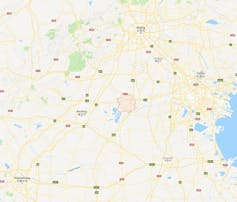Xiong'an, Xi Jinping's new city-making machine turned on
- Written by Richard Hu, Professor, Faculty of Arts and Design, University of Canberra
Behind mega urban projects often stand strong political wills. Xiong’an is called China’s number-one urban project, and it is orchestrated by President Xi Jinping.
China is midway through the largest urbanisation process in human history. New cities have mushroomed in recent decades. The most prominent are Shenzhen and Pudong Shanghai, both of which are now major global financial and business centres.
Read more: With a bullet: China's high-speed rail dream begins to take flight
Shenzhen and Pudong Shanghai were credited to Deng Xiaoping. China’s then leader pushed forward the construction of these cities from scratch, to drive his agenda of national reform and opening up to the world.
After his first five-year term as president, it is clear that Xi Jinping’s political ambition is to equal or even surpass the records of Mao Zedong and Deng Xiaoping. Mao and Deng each ruled China for nearly three decades, in person and by selecting their successors.
Xi has proclaimed a “new era”, enthroned his “thoughts”, appointed his allies, and outlined national modernisation goals to 2035 and even as far ahead as 2050.
He also amended the Chinese Constitution to remove the two-term restriction on the presidency. This was the final barrier to pursuing power after 2023, when he was due to step down.
What else? Xi needs a new city, with his name imprinted!
Putting a new city on the map
There are three mega-city regions in eastern China. Shenzhen is in the Pearl River Delta, Pudong Shanghai is in the Yangtze River Delta, so Xi’s new city must be in the Beijing-Tianjin-Hebei region.
 Xi Jinping’s new mega-city, Xiong’an (the area in red) will be located midway between Beijing, Tianjing and Shijiazhuang (click to enlarge).
Google Maps
Xi Jinping’s new mega-city, Xiong’an (the area in red) will be located midway between Beijing, Tianjing and Shijiazhuang (click to enlarge).
Google Maps
Xi selected Xiong’an, an underdeveloped area located centrally between Beijing, Tianjing and Shijiazhuang, the capital city of Hebei Province. Xiong’an has a vast water area, a rare natural endowment in northern China.
Xi stressed the principles of “world vision, international standards, Chinese characteristics and high goals” in planning and building Xiong’an. A “Millennium Plan” and a “national strategy”, Xiong’an should be different from, or more ambitious than, its predecessor new cities. Shenzhen was created in the 1980s; Pudong Shanghai in the 1990s; Xiong’an should represent a city-making approach with Chinese characteristics in the 21st century.
Read more: Shanghai, a modern metropolis born of a refugee crisis
What’s the plan?
On April 21, 2018, China’s official Xinhua News Agency released the planning guidelines for Xiong’an. This followed their endorsement by the Central Committee of the Chinese Community Party and the State Council.
These planning documents will guide the development of Xiong’an until 2035 and envision its long-term progress until the middle of this century. This aligns with Xi’s timelines for national modernisation goals.
Xiong'an is presented as central to President Xi Jinping’s vision of national development for decades to come.Key elements of the guidelines are:
visions: a green, ecological and liveable new area; an innovation-driven development; a demonstration area of coordinated development; and a pioneer in China’s modernisation strategy
targets: 2035 – basic construction of a high-level socialist modern city that is green, low-carbon, smart, competitive, influential and harmonious with humans and nature; mid-21st century – comprehensive construction complete, a key pillar of the world-class Beijing-Tianjin-Hebei city region
spatial specifications: green space 70%, development land 30% (a total area of around 530km²), arable land 18% (including permanent farming land 10%), population density 10,000 people/km²
non-capital city functions transferred from Beijing: universities and research institutions, hospitals and health, finance, advanced services and high-tech industries
priority industry sectors: new information technology, life and biological sciences, new materials, advanced modern services, and green and ecological agriculture
transport connectivity: high-speed rail network – 20 minutes to the new Beijing airport, 30 minutes to Beijing and Tianjing, and 60 minutes to Shijiazhuang; expressway network – 60 minutes to Beijing and Tianjing, and 90 minutes to Shijiazhuang; 90% green transport share and 80% public transit share in vehicle transport in the initial development area; exploring intelligent driving and logistics systems.
Can it be done?
The targets suggest a new city with a population of 5 million erected by 2035 and completed by around 2050. Be mindful: Chinese city plans are normally “conservative” in setting targets.
Is the plan achievable? State ownership of land and a centralised planning system will ensure it happens at a speed and scale hardly paralleled elsewhere. Think of Shenzhen and Pudong Shanghai.
However, the most important factor is whether President Xi’s desired political pathway remains on track.
Authors: Richard Hu, Professor, Faculty of Arts and Design, University of Canberra
Read more http://theconversation.com/xiongan-xi-jinpings-new-city-making-machine-turned-on-95442




